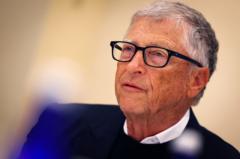The Gates Foundation, after contributing $100 billion, expects to give an additional $200 billion to address health and poverty challenges worldwide.
Bill Gates to Donate 99% of Wealth by 2045 to Advance Charitable Causes

Bill Gates to Donate 99% of Wealth by 2045 to Advance Charitable Causes
Microsoft co-founder reveals plans to accelerate philanthropic efforts through his foundation, aiming to end its operations in 2045.
Bill Gates, the co-founder of Microsoft, has announced a significant shift in his philanthropic strategy, expressing his commitment to donate 99% of his immense fortune over the next two decades. In a recent blog post, Gates outlined his intention to expedite charitable contributions via his foundation, ultimately planning to conclude its operations by 2045.
"I want to ensure that when I pass away, the narrative won't be that I died with wealth," Gates stated in his blog. Currently, at the age of 69, he has overseen the disbursal of approximately $100 billion towards various health and development initiatives. He anticipates that, depending on financial fluctuations, the foundation will allocate an additional $200 billion to support similar causes within the next 20 years.
In his writing, Gates referenced the influential 1889 essay "The Gospel of Wealth" by Andrew Carnegie, emphasizing the notion that the affluent bear a responsibility to return their fortunes to society. Gates reiterated Carnegie’s sentiment, which condemned the concept of dying wealthy.
This announcement marks a notable acceleration in Gates’ charitable endeavors, diverging from prior plans that envisioned the foundation continuing its work well after his and his ex-wife Melinda's deaths. Even with the upcoming donations, Gates' wealth will still likely leave him among the billionaires, as he ranks as the fifth-richest individual globally, boasting a current net worth of $108 billion.
Gates illustrated his financial timeline in the blog with a visual representation, showcasing his wealth trajectory plummeting towards zero by 2045, while also revealing the foundation’s plan to leverage its endowment for the upcoming donations. Co-founder of Microsoft with Paul Allen in 1975, Gates has gradually distanced himself from the company, stepping down as CEO in 2000 and as chairman in 2014.
Influenced by philanthropists like Warren Buffett, Gates has become a prominent figure in global health and development. Yet, he has faced criticism over the influence of his foundation and accusations of using its charitable status to minimize tax obligations. In his recent communications, he stated three primary goals for his foundation: eliminating diseases that harm mothers and children, combating infectious diseases such as malaria and measles, and alleviating poverty for millions.
Gates has been vocal in his critiques of leading countries like the US, UK, and France for reducing foreign aid budgets. He expressed concerns about the commitment of wealthy nations to assist vulnerable populations, assuring that the Gates Foundation will continue its efforts to empower those in need.
In an interview with the Financial Times, Gates did not shy away from criticizing Tesla CEO Elon Musk, implicating him in detrimental impacts on child welfare due to budget cuts affecting international aid. Gates pointed to the repercussions of halted grants in places like Mozambique, highlighting the real-life consequences of funding decisions on public health.
The Gates Foundation is also recognized as a contributor to BBC Media Action, the charitable branch of the BBC, which operates separately from its news operations. Bill Gates emphasized the foundation's ongoing mission to fight poverty and disease, vowing to uphold efforts that assist individuals and communities striving for a better future.

















